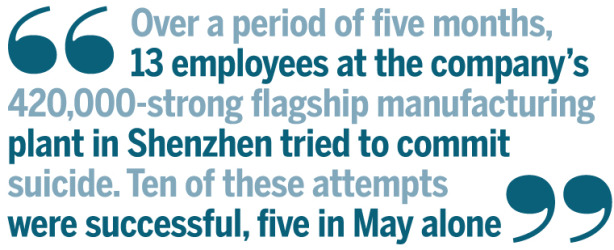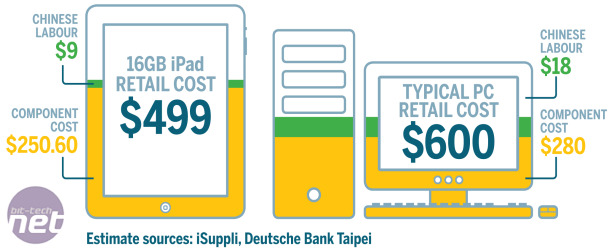Made in China: Tech, Ethics and Economics
September 1, 2010 | 07:28

Made in China: Tech, ethics and economics
Editor's foreword: Earlier this summer, stories of a spate of suicides in the Chinese factories of Hon Hai Precision Industry surfaced - cue a blitz of media coverage, columns and blog comments all rushing to debate the ethics of manufacturing tech cheaply in China. Much of this coverage dealt quickly and glibly with issues that are complex and hard to grasp. Rather than rushing to join in, we decided to take our time with a well researched article about this important topic.The writer is a Hong Kong based business journalist who has reported on Chinese economics for the last five years. The following article is long; the numbers aren't FPS or MHz, and yes the complexity isn't in understanding something cool like a new GPU or a piece of clever design.
It is, however, important and relevant. We write about and enjoy the good side of tech manufacturing and innovation, but that doesn't mean we should avoid the issues that come with it. We hope that just as our regular coverage brings you closer to the hardware and gives you the information to make the right choices that this article gives you useful information and perspective on the ethics and economics of Chinese manufacturing.
Hon Hai Precision Industry was, until recently, anonymous to those outside the consumer electronics business. Even now the Taiwan-based company is best known by its trading name, Foxconn Technology Group. Hon Hai’s clients, however, need no introduction: Apple, Intel, Cisco, Hewlett-Packard, Dell, Nokia and Motorola, to name but a few.
As the largest electronics manufacturing services (EMS) provider in the world, Hon Hai is probably the unseen hand behind the smartphone in your pocket, the motherboard in your PC and the kit handling the internet connection you're using to read this article.
Its army of workers offer high productivity at low cost. They're one of the main reasons why, according to some estimates, Apple's margin on the iPhone is close to 60% - unsurprising when you consider the iPhone 4's hardware costs around $190 and it retails, when bought contract free, for £500 / $600.

Cogs started to fall off Hon Hai’s well-oiled machine in early 2010. Over a period of five months, 13 employees at the company’s 420,000-strong flagship manufacturing plant in Shenzhen, in the heart of southern China’s Pearl River Delta, tried to commit suicide. Ten of these attempts were successful, five in May alone.
It didn’t take long to apportion blame, and the company was accused of being a sweatshop and overlooking the basic needs of its workers “for the sake of profit,” by China Labor Watch, a New York-based rights group. “Many of these deaths have been linked to the horrible conditions at Foxconn facilities.”
Hon Hai’s clients responded by saying they would looking into the situation. The company itself launched a PR offensive. Journalists were invited to tour the Shenzhen production facilities. The company refuted the sweatshop allegations and showcased its employee support policies – which include the recruitment of 100 counsellors, the creation of an “emotional support hotline,” and prayers from Buddhist monks – claiming these were responsible for preventing more than 30 suicide attempts. Management of the staff dormitories at two Hon Hai campuses outside Shenzhen was transferred to two local commercial property management firms.

It's hard to ascertain the true cost of a high-tech product, but one thing that is certain is that the cost of manufacturing is low.
Most significantly, Hon Hai said it would increase the minimum wage for assembly line workers, line leaders and supervisors in Shenzhen to RMB2,000 (US$293) per month. The current minimum wage for the part of the city in which the company operates is RMB900 a month. This came after Hon Hai first announced a 20% wage hike for all of its workers in China and then, days later, revised the increase to 30%.
“We recognize our responsibility as a global leader in electronics manufacturing, and take this responsibility very seriously,” said Terry Gou, Taiwan's richest man, and the founder and majority owner of Hon Hai. He added that the raise is designed to ensure employees have a stable income and therefore reduce the need for overtime work.
The impact of the wage hike will be felt throughout the electronics industry; most market watchers accept that Hon Hai’s competitors will be obliged to follow suit. These price pressures will be passed on to consumers as higher prices.
So is that it then? A blip of Western media coverage, a promise of investigations and a pay rise? In fact, the situation is more nuanced than the headlines and the quick reactions suggest. The issues at stake are classic slow-burners: they concern the evolution of China’s economy, the role manufacturing plays within it and of course, the desires of Western firms and consumers.

MSI MPG Velox 100R Chassis Review
October 14 2021 | 15:04








Want to comment? Please log in.